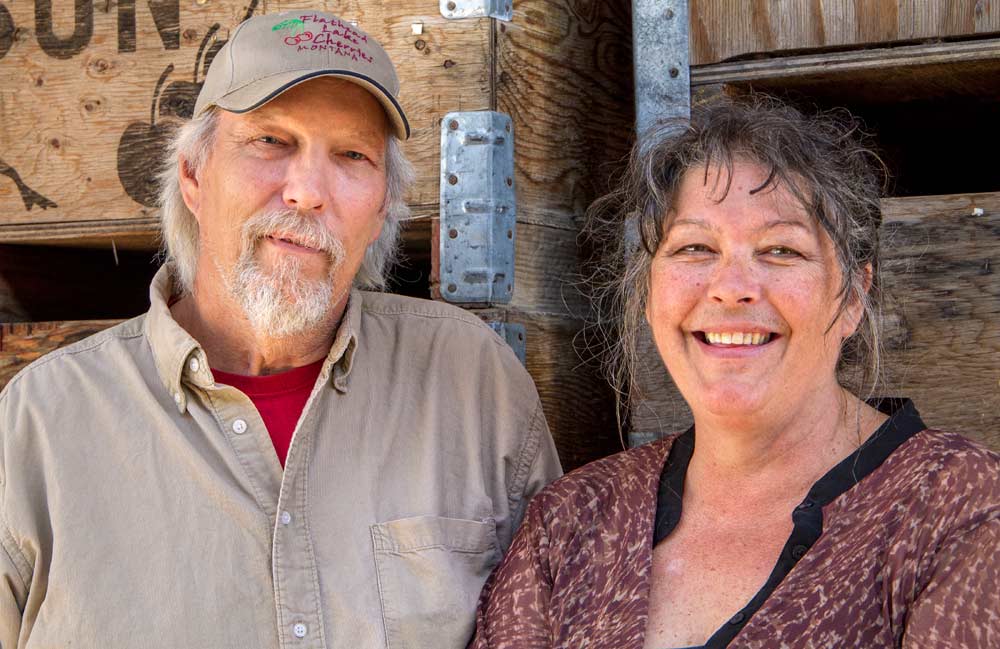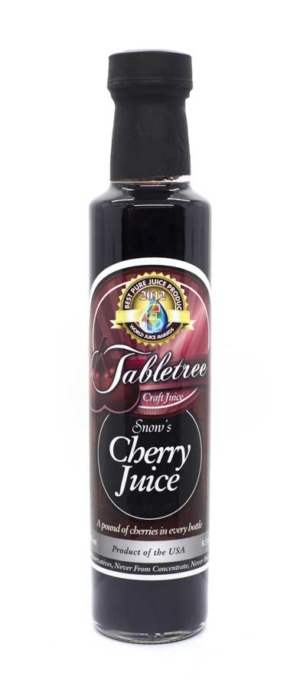
Gary and Susan Snow stand outside the production facility for their bottled cherry juice, sold under the brand Tabletree Juice, south of Bigfork, Montana last July. (Shannon Dininny/Good Fruit Grower)
The Pacific Northwest’s record sweet cherry crop last year drove down prices for many growers, but others in the industry see the potential for new products from increasing tonnage.
Case in point: Gary and Susan Snow and their Tabletree juice company in Montana’s Flathead Valley.
In its first season of operation at the Flathead Valley Cherry Growers Cooperative warehouse on the east shore of Flathead Lake, the company processed 60,000 pounds of otherwise culled cherries, resulting in some 70,000 8.5-ounce bottles of juice. And this after a late start to the season, as they were still putting finishing touches on their small bottling line in early August.

Snow’s Cherry Juice by Tabletree Montana, LLC, photographed on Tuesday, April 17, 2018. (TJ Mullinax/Good Fruit Grower)
“Last year was about finishing the plant. This year will be about sales and growth,” Gary Snow said.
Sales have been strong. Already the Snows are looking at ways to expand their season and product lines by getting earlier-season cherries from Washington and producing juices from local apples, peaches and native berries.
In test runs with some native berries last year, they came up with some “really good mixes, and we’ll be excited to try to push that forward,” Susan Snow said.
Susan was a third-generation fruit grower in British Columbia’s Kootenay region, her family having moved to the area in 1910.
Gary’s family, meanwhile, settled in New York’s Finger Lakes area, where his great-grandfather opened a juice company that competed with Welch’s, which bought the company after his great-grandfather died. “My blood is purple and red, I guess,” Gary said with a laugh.
The couple lived and raised their son in northwest Montana before moving closer to Susan’s family in Canada in 1995 — the year of the first big harvest of Lapin cherries there — and ran the family farm for years until rain wiped out their crop in 2009.
They knew they needed to add value to the farm and began the juicing operation.
“The farmer is at the bottom of the ladder. That’s why we moved up to the next rung,” she said. “In British Columbia, some years it cost $1.70 to produce, pick and pack the fruit, and some years we would only get 80 cents a pound back — and we wouldn’t know what we would get when we sent it off. We couldn’t afford to continue farming.”
Just three years later, in 2012, their Black Cherry Juice won the Best Pure Juice award at the World Juice Conference in Barcelona, Spain.
Montana kept calling them home, though.
They weren’t big enough to attract investors to open up shop in the U.S., but board members for the Flathead Valley Cherry Growers Cooperative saw potential in the idea.
Cherries from co-op growers are hydrocooled at the co-op’s warehouse before being trucked to Monson Fruit in Washington’s Yakima Valley, where it is sorted and packed, much of it for sale back in Montana.
The culled fruit also is returned to the Flathead Valley warehouse for another round of sorting for rot or disease, followed by the Snows’ patented juicing process.
Last year, they hired 12 seasonal, full-time employees for six weeks of juicing. They plan to expand their capacity — they’re aiming to double their bottling of cherry juice this year — with additional juices and other products, such as culinary reductions and sauces.
They also are considering the potential of licensing their technology to help pattern an elite juice industry after the wine industry, with distinct products from distinct regions, climates, varietals and soils.
“The whole future looks exciting,” Susan Snow said. “The growers, the packing houses, and us can work hand-in-hand.”
Bruce Johnson, president of the Flathead Lake Cherry Growers Cooperative, agreed. “Their first run last year was very successful making juice in our plant, and we’re really optimistic about them,” he said. “They’ll be growing, and that’s good for our industry.” •
—by Shannon Dininny






Leave A Comment